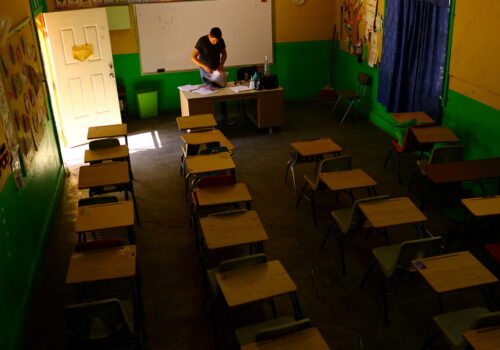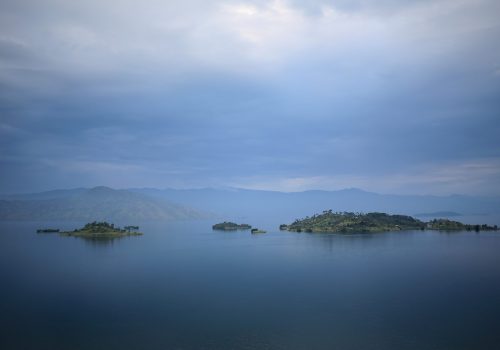Making Africa a top priority for Bretton Woods Institutions
For the first time in fifty years, the Annual Meetings of the World Bank-IMF were held in Africa in October 2023, putting the continent at the center of discussions. That focus is overdue. The Bretton Woods Institutions (BWIs) need to make Africa’s development a top priority, both because it has missed out on the growth that propelled many other regions in recent decades and because it is has the potential to be the world’s next growth engine.
Africa’s growth potential
Over the past four decades, extreme poverty rates in the world, measured as share of population living with less than $2.15 a day (2017 PPP), declined from around 44 percent to less than 10 percent. However, as of 2019, the share in Sub-Saharan Africa was around 35 percent—and is expected to have risen to 45-50 percent in the past five years because of the back-to-back shocks of the pandemic, debt and inflation crises, and increasing food and energy prices caused in part by the Russia-Ukraine war. Clearly, Sub-Saharan Africa has missed the benefits of globalization in the past four decades which lifted billions out of poverty around the world through trade and an integrated global supply chain.
At the same time, Africa has tremendous potential which, if unleashed, can lead to rapid growth in the continent and higher aggregate demand for globally produced goods and services. Africa’s growth could revitalize global growth, which has been decelerating for various structural reasons over the past two decades. With deeper engagement of BWIs and other Multilateral Development Banks (MDBs) and International Financial Institutions (IFIs), African economies can seize the moment and become the engine of global growth.
Promoting public-private partnerships
As the World Bank’s and other MDBs’ financial and technical resources are becoming increasingly limited, they need to shift their focus from merely providing loans and various forms of financial assistance to actively catalyzing the flow of other quasi-public and private resources into the development of Africa’s human capital and social and physical infrastructure. Therefore, BWIs and other MDBs should prioritize strengthening financial governance and legal structures of African economies which would encourage private investment in the continent. The establishment of the Global Infrastructure Facility (GIF) by the World Bank marks a significant stride in this direction. However, much more needs to be done to establish infrastructure as a new asset class in global capital markets and the BWIs, engaging with more than forty other MDBs and IFIs, have a unique position to lead the global discussion on this front. The case of quasi-state institutional investors is of particular importance. With more than $70 trillion of assets under management (AuM) and long-term investment horizons, SWFs, public and private pension funds, and various retirement saving vehicles are uniquely positioned to bridge Africa’s growing infrastructure financing gap.
Accelerating Africa’s regional integration
BWIs including the World Trade Organization (WTO) can play crucial roles in promoting regional integration in Africa through various mechanisms and initiatives. First and foremost, the MDBs, with the World Bank leading the efforts, can provide financial support for regional infrastructure projects, such as transportation networks, energy grids, and communication systems. These projects can facilitate the movement of goods, services, and workers between countries in the region, promoting economic cooperation and development. Trans-Saharan Highway and Trans-African Railway are two examples of such projects that could facilitate intra-continental trade in Africa. Second, the IMF can help countries in the region manage their monetary and exchange rate policies to facilitate cross-border financial flows and reduce currency volatility. This can enhance economic stability and create a conducive and fairer environment for regional trade and investment. Third, the MDBs with WTO leading the efforts, can support the negotiation and implementation of regional trade agreements or customs unions, which aim to reduce trade barriers and increase market access among participating countries. Efforts such as African Continental Free Trade Area (AfCFTA) must be enhanced and supported with relevant regulatory and infrastructure development project.
Prioritizing Africa’s integration into global supply chains
Given its triple advantages—vast natural resources, growing and young population, and its geo-strategic location and access to open seas—Africa can play a central role in the global economy and supply chain. However, Africa is currently responsible for only about 5 percent of global trade. BWIs, and other MDBs and IFIs should therefore prioritize programs and projects that would leverage Africa’s triple advantages in the global economy, making Africa an essential and indispensable part of the global supply chains, energy, and labor and consumer markets for decades to come.
Programs that could speed Africa’s inclusion in global supply chains include:
- Vocational training programs would provide African youth with the skills in highest demand in today’s globalized economy.
- Construction of ports and linking them via railways and roads would reduce the cost of trade with and inside Africa and help accelerate Africa’s integration.
- Development of solar, wind, and green hydrogen energy production could make Africa the global hub of renewable energy with massive export potential, especially to Europe and Middle East.
- Agricultural development would help Africa benefit from its massive agricultural potential and potentially allow it to become the world’s major supplier of food and agricultural products.
- Developing Africa’s tourism industry should be a priority since Africa is home to some of the world’s magnificent natural and historical attractions. Given that tourism industry makes up more than 10 percent of global GDP, MDBs should prioritize developing Africa’s tourism industry, which can contribute significantly to the continent’s development and long-term employment.
Multilateralism is the key
Africa’s needs go beyond debt restructuring. The continent has tremendous potential and a “big push” from BWIs, other MDBs and IFIs, and global private sector and institutional investors, mixed with meaningful steps by Africa’s leaders to improve their governance structure, can unleash an economic renaissance in Africa. The revival of multilateralism, with Africa having more voice and representation in BWIs and other institutions of global economic governance, is a necessary first step.
Amin Mohseni-Cheraghlou is a macroeconomist with the GeoEconomics Center and leads the Atlantic Council’s Bretton Woods 2.0 Project. He is also a senior lecturer of economics at American University in Washington DC. Follow him on X at @AMohseniC.

At the intersection of economics, finance, and foreign policy, the GeoEconomics Center is a translation hub with the goal of helping shape a better global economic future.
Further reading
Tue, Jan 9, 2024
Climate change prioritization in low-income and developing countries
Issue Brief By
This policy brief examines the impact of climate change on education, health, and other development priorities for low-income and developing countries.
Tue, Dec 5, 2023
How green banking can unlock climate solutions in Africa
Report By Jean-Paul Mvogo
In order to succeed in its transition to a green and inclusive economy, Africa must ramp up its green banking ecosystems and mobilize resources needed to finance climate mitigation and adaptation while also addressing deforestation, pollution and biodiversity loss.
Mon, Oct 9, 2023
Reimagining Africa’s role in revitalizing the global economy
Issue Brief By Amin Mohseni-Cheraghlou
The African continent potential to revitalize the world economy and reverse the downward trend in global growth. However, for this to materialize, it needs substantial investments in its physical and social infrastructure.
Image: World Bank-IMF Annual Meetings in Marrakesh, Morocco, October 9, 2023: World Bank/Grant Ellis


